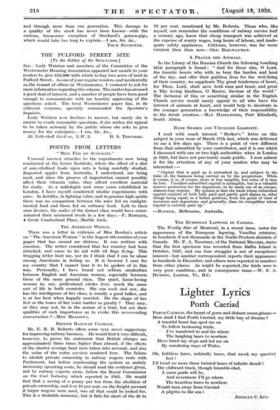POINTS FROM LETTERS
"MICE FED ON SUNLIGHT."
Unusual interest attaches to the experiments now being conducted at the Lister InstitUte, where the effect of a diet of sun-vitalized foods upon rats is being carefully studied. Imported apples from Australia, I understand, are being used; and since the process of importation cannot possibly affect their vitamin value, they afford excellent material for study. As a radiologist now some years established in London, I have myself conducted similar experiments with mice. In fertility, in fighting value, and in genuine high spirits there was no comparison between the mice fed on sunlight- treated food and those fed on ordinary food. Left to their own devices, the males of the former class would have exter- minated their unsunned rivals in a few days.—F. ROBERTS, 4 Great Cumberland Place, Marble Arch.
THE AMERICAN WOMAN.
There was a letter in criticism of Miss Borden's article on "The American Woman" in the August 4th number of your paper that has caused me distress. It was written with emotion. The writer considered that her country had been attacked, and came to its aid with all flags flying. This bragging letter hurt me, nor do I think that I can be alone among Americans in feeling so. It is because I care for my country that I cannot bear it to be spoken of in this way. Personally, I have found not seldom similarities between English and American women, especially between those of the same general class. The quiet, home-loving woman in, say, professional circles lives much the same sort of life in both countries. She can cook and sew, she has the intelligence of her class, is usually a good talker, and is at her best when happily married. Do the shape of her feet or the tones of her voice matter so greatly ? They may, or they may not, be in the nature of a trial, but are their qualities of such importance as to evoke this never-ending conversation ?—Miss MEADOWS.
BRITISH RAILWAY CHARGES.
• Mr. E. R. B. Roberts offers some very novel suggestions for improving railway business. He would find it very difficult, however, to prove his statement that British charges are approximately three times higher than abroad, if the effects of the shorter average haul were taken into account, and also the value of the extra services rendered here. The failure to abolish private ownership in railway wagons rests with Parliament, but before condemning the system as unduly increasing operating costs, he should read the evidence given, not by railway experts alone, before the Royal Commission on the Coal Industry which reported in 1925. He would find that a saving of a penny per ton from the abolition of private ownership, and .5 or 10 per cent, on the freight account if larger wagons were used, was all that could be looked for. This is a desirable economy, but it falls far short of the 50 to 75 per cent. mentioned by Mr. Roberts. Those who, Me myself, can remember the conditions of railway service half a century ago, know that cheap transport was achieved at the expense of scanty wages, long hours of labour, and inade- quate safety appliances. Criticism, however, was far more virulent then than now.—OLD RAILWAYMAN.
A PRAYER Post Aramars.
In the Litany of the Russian Church the following touching little paragraph is found : "And for those also, 0 Lord, the humble beasts who with us heir the burden and heat of the day, and offer their guiltless. lives for the well-being of their country, we supplicate Thy great tenderness of heart, for Thou, Lord, shalt save both man and beast, and great is Thy loving kindness, 0 Master, Saviour of the world." The inclusion of this or something similar in the English Church service would surely appeal to all who have the interest of animals at heart, and would help to inculcate in the younger generation a knowledge of their responsibility to the dumb creation.—MAY HASELWOOD, Port Elizabeth, South Africa.
BANK SHARES AND UNCALLED LIABILITY.
I read with much interest " Broker's " letter on this subject in your issue of March 17th last, which was delivered to me a few days ago. There is a point of view different from that submitted by your contributor, and it is one which I discussed with one or two high authorities when in London in 1925, but have not previously made public. I now ,submit it for the attention of any of your readers who may be interested :—
" Capital that is paid up is embarked in, and subject to the risks of, the business being carried on by the proprietors. While it exists, it is, of course, more or less tangible, but some of it may be lost. Uncalled subscribed capital is intangible, but is a valuable reserve protection for the to be made use of as circum- stances may require. , My opnuon is that the bank whosp subscribed capital consists of both fully paid and partly paid shares is, other things being equill, in a better position, from the -point of viewi of investors and depositors, and generally; than its competitor whose capital is entirely paid up."
—BANKER, Melbourne, Australia.
THE EUROPEAN LAPWING IN CANADA.
The Weekly Star of Montreal, in a recent issue, notes the appearance of the European lapwing, Vanellus cristatus, in hundreds if not thousands in the North-Western districts of Canada. Mr. P. A. Taverner, of the National Museum, states that the first specimen was recorded from Baffin Island in October, 1927, and one lone straggler is not of exceptional interest—but another correspondent reports their appearance in hundreds in December, and others were reported in numbers from other places. As might be expected, the birds were in very poor condition, and in consequence tame.—W. F. A. HUDSON, Luxton, Vi., B.C.
































 Previous page
Previous page